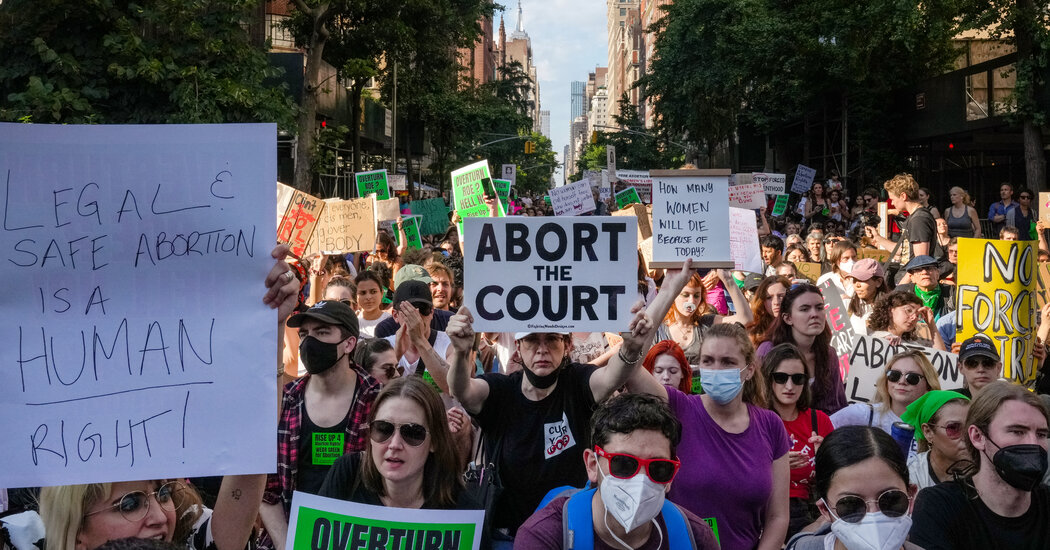
President Biden and the Democratic leadership had months to prepare for the fall of Roe v. Wade, and even after a draft ruling was leaked in May, they had weeks to muster concrete plans to counteract a once-unimaginable outcome that suddenly seemed inevitable.
Yet as Republicans celebrated the culmination last week of a methodical 50-year campaign to topple the right to an abortion in America, the initial response from the president and his party — exhortations to vote, calls for contributions, micro-websites portraying Republicans as extremists — struck even many fellow Democrats as painfully inadequate to meet a moment of peril.
“It didn’t seem like there was a game plan,” said Nina Smith, a Democratic strategist.
The Supreme Court’s back-to-back decisions last week on guns and abortion — tying the hands of blue states in regulating firearms while freeing red states to ban abortions — punctuated the degree to which the court’s solid 6-3 conservative majority is poised to remake American life, swinging the policy pendulum to the right on touchstone issues.
Now an increasingly vocal cohort of Democrats is calling for the party’s leadership, starting with Mr. Biden, to broaden what’s seen as politically possible, before liberal priorities are stymied or reversed by the high court for years to come. But those who want to expand the Supreme Court or move to impeach justices who once spoke of Roe as settled law are confronting an institutionalist president who has long been averse to radical changes to the judiciary.
So far, the centerpiece of Mr. Biden’s response has consisted of urging voters to rally behind Democrats in the midterms, hoping to galvanize a Democratic Party base that polls have shown is in a sour mood.
Speaking from the White House on Friday as many of his highest-ranking female advisers watched from the wings, Mr. Biden advanced virtually no new abortion-rights proposals. He acknowledged that his administrative powers were limited. And he conveyed the simple and accurate fact that Democrats do not currently have the votes in Congress to act to protect abortion rights at the national level.
“This fall, Roe is on the ballot,” he said.
The White House sees the embracing by congressional Republicans of a potential national abortion ban at 15 weeks as a potential motivator for voters. And they view as politically troublesome for the G.O.P. the possibility, raised by Justice Clarence Thomas, that the court could eventually target past decisions establishing constitutional rights to gay marriage and contraception.
“The ultra-MAGA agenda on choice has never been about ‘states’ rights,’” said Jennifer Klein, the executive director of the White House’s new Gender Policy Council. “This has always been about taking away women’s rights, in every single state.”
There are early signs of engagement from the Democratic base. Protests spilled into the streets in cities nationwide. And the ruling on Friday unleashed a gusher of Democratic donations: $20.5 million that day on ActBlue, the Democratic online donation-processing platform. It was the single biggest day for contributions on the site since 2020, according to a New York Times analysis. By late Tuesday morning, a total of more than $50 million had been processed since the decision came out on Friday.
From Opinion: The End of Roe v. Wade
Commentary by Times Opinion writers and columnists on the Supreme Court’s decision to end the constitutional right to abortion.
But Rebecca Katz, a Democratic operative who works with progressive candidates, demanded more from Mr. Biden and other party leaders besides simply asking for money or votes.
“This is one of those moments where the people in power have to do more than the people who are voting for them,” she said.
Those calling for the potential impeachment of Supreme Court justices are not just far-left Democrats but moderates, including Representative Charlie Crist of Florida, a Republican-turned-Democrat who is running for governor in 2022.
“I’m a former attorney general of Florida, and I know what lying is,” he said in an interview, referring to testimony from Justices Neil M. Gorsuch and Brett M. Kavanaugh, during their congressional confirmation hearings, on upholding abortion precedents.
And he said that while there was not currently the will to act among Democratic leaders in Congress, he expected that to change. “Frustration requires action,” Mr. Crist said, “or there’s no vent for it.”
As Joshua Karp, a Democratic strategist and an adviser to Mr. Crist, put it, “If we want to inspire people to vote, we have to actually inspire them.”
The split inside the Democratic coalition is partly generational, as younger activists make the case that the Republican Party and the dynamics in the nation’s capital have fundamentally changed in the decades since Mr. Biden, 79; House Speaker Nancy Pelosi, 82; and Senator Chuck Schumer, 71, the majority leader, arrived in Washington. An offhand remark on Friday by Representative James Clyburn, 81, the highest-ranking Black lawmaker in the House, that the ruling was “anticlimactic” ricocheted through younger and more progressive circles.
It is not that restive Democrats do not accept the plain reality that, with a 50-50 Senate and two Democratic senators committed to preserving the filibuster, there is little that can be done legislatively to preserve abortion rights. But they still want to hear a longer-term plan of action articulated beyond the fall midterm elections.
“Leadership had a long time to know this was coming and to prepare something more than outrage from a podium and fund-raising appeals,” said David Atkins, a Democratic National Committee member from California, who wanted to hear calls for structural changes to the court or the Senate. “There needs to be more fight.”
One episode that struck Mr. Atkins and others as “tone deaf” came on Friday outside the Capitol. Ms. Pelosi and other House Democrats gathered on the Capitol steps to celebrate the passage of a historic, if piecemeal, package on guns. They sang “God Bless America” together as Roe protesters raged across the street in front of the Supreme Court.
“That moment crystallized it perfectly,” said Ms. Smith, the Democratic strategist. “The Titanic is sinking, and the band is still playing.”
Around the same time as her colleagues were singing on the Capitol steps, Representative Alexandria Ocasio-Cortez of New York, a leading progressive, was across the street, joining in chants of “Illegitimate!” in front of the Supreme Court.
“Into the streets!” she shouted into a megaphone. “Into the streets!”
Ms. Ocasio-Cortez has said that the party must not lapse back into “familiar tactics,” suggesting that Democrats pursue court expansion, expanding of federal access to abortion pills or even abortion clinics on federal lands.
On Monday, Ms. Pelosi sent a letter to Democratic lawmakers about possible upcoming votes and action: on protecting women’s data in reproductive health apps from “sinister” prosecutors targeting those who have abortions, on the right to travel across state lines and on enshrining the protections Roe v. Wade provided into law, though such a bill — which has already passed the House — lacks sufficient support in the Senate.
The list did not include some of the most ambitious items on the progressive wish list: enlarging the court or starting investigations into justices who suggested during confirmation hearings that Roe v. Wade was settled precedent. Ms. Pelosi did renew her call to eliminate the filibuster.
Max Berger, a progressive strategist, sees the country’s political institutions as already suffering a systemic failure. He said his party had failed to adjust to the tactics of Senate Republicans — who for months held open a Supreme Court seat during former President Barack Obama’s final year and confirmed another justice just before former President Donald J. Trump’s losing re-election bid — and have been left to fight an asymmetrical war.
“If you’re Nancy Pelosi or you’re Joe Biden and you’ve lived your entire adult lives in these institutions that they thought basically worked, it’s very difficult to wrap your head around the fact that they’re collapsing,” said Mr. Berger, who now works for More Perfect Union, a nonprofit news media advocacy group. “The thing we’re asking for more than anything else is for people to stop living in the past.”
Mr. Berger added: “At some level, the most important thing Joe Biden could do is say: ‘When I told you the Republican fever would break after Trump, I was wrong. We cannot do what we’ve been doing for my entire career.’”
Mr. Biden, an avowed institutionalist and a proud former chairman of the Senate Judiciary Committee, has long resisted the more activist wing of his party. In his first year as president, he appointed a commission to examine the Supreme Court, in part to placate the left, and even that body avoided taking a stance on expanding the court. On Saturday, before flying to Europe for an international summit, Mr. Biden expressly avoided saying the court was broken.
“I think the Supreme Court has made some terrible decisions,” Mr. Biden said.
Melissa Byrne, a progressive activist who has pushed the White House to eliminate student debt, lamented a lackluster response to the overturning of Roe as part of a broader frustration with Democratic leadership’s unwillingness to be more forceful.
“A lot of the frustration comes from this institutional loyalty to how things used to be,” Ms. Byrne said. “I wish the Senate would go for broke and get rid of the filibuster and show the country what we can accomplish.”




